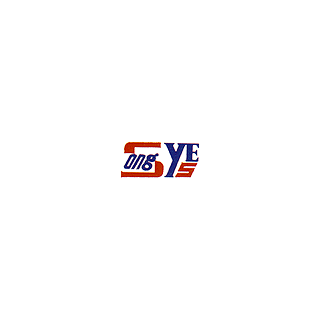Trailer Light Converter
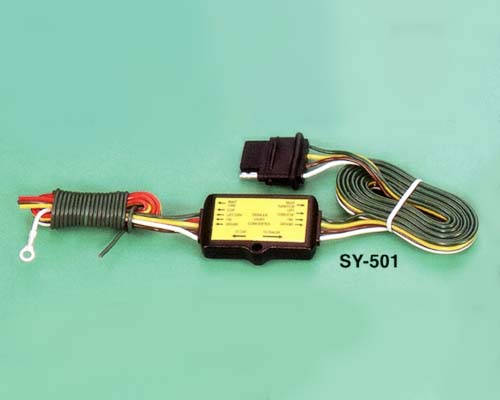
Trailer Light Converter
Model/Item No.:SY-501
PVC . 5 wires to 4 wires . Trailer light converter
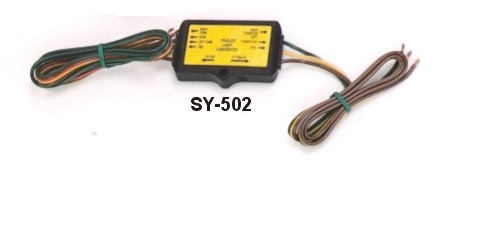
Converter
Model/Item No.:SY-502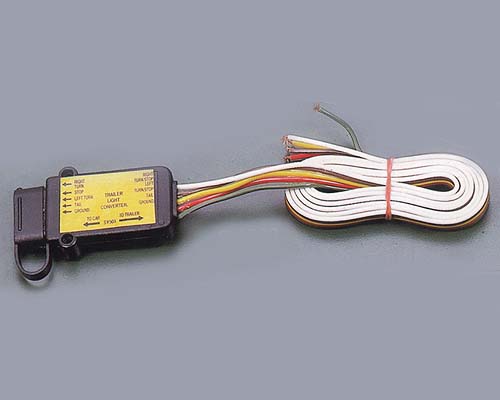
Model/Item No.:SY-503
Converter with 4 pole female connectors and converters 18G bonded wire 60'
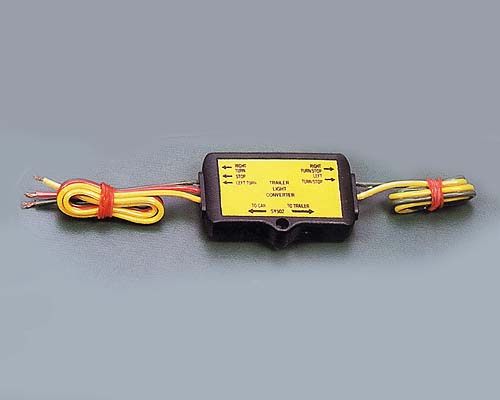
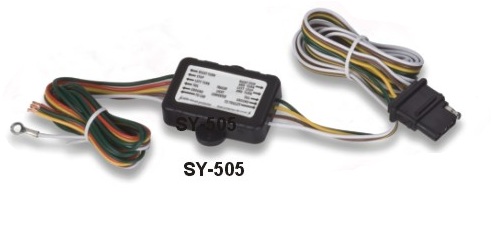
1. Determine the type of trailer light converter you need. Different trailer light converters are designed to fit different types of trailers, so you'll need to make sure you get the correct one for your trailer.
2. Consider the power output of the converter. You'll need to make sure that the converter you buy is powerful enough to power your trailer's lights. If the converter isn't powerful enough, your lights won't work properly.
3. Check the compatibility of the trailer light converter. Make sure that the converter is compatible with the type of trailer lights you have. If the converter is not compatible, it won't work properly.
4. Look for features that you need. Different trailer light converters have different features, so make sure you get one with the features you need. For example, some trailer light converters have built-in surge protection or voltage regulation.
5. Read customer reviews. Reading customer reviews can help you get a better idea of how well a particular trailer light converter works. Make sure you read reviews from customers who have used the same type of trailer as you.
Trailer Light Converter
A trailer light converter, also known as a trailer wiring converter or simply a converter box, is an electrical device used to adapt and convert the electrical signals and wiring from a towing vehicle's lighting system to match those of a trailer or towed vehicle. This is typically necessary when the towing vehicle and the trailer have different electrical systems or wiring configurations.
Here are some key points about trailer light converters:
Purpose: The main purpose of a trailer light converter is to ensure that the lights and signals on the trailer match the lighting system of the towing vehicle. This includes functions like brake lights, turn signals, running lights, and sometimes reverse lights.
Voltage Conversion: In many cases, trailer light converters are used when the towing vehicle has a different voltage system than the trailer. For example, some vehicles use a 12-volt electrical system, while certain trailers use a 24-volt system. The converter adjusts the voltage to ensure compatibility.
Connector Types: Trailer light converters are available in various configurations to match different connector types commonly used on trailers, such as 4-pin flat, 5-pin flat, 7-pin round, or others. The converter is selected based on the towing vehicle's connector and the trailer's connector.
Compatibility: When choosing a trailer light converter, it's essential to ensure that it is compatible with both the towing vehicle's electrical system and the trailer's electrical system. This includes matching the number of pins or blades and the specific wiring configuration.
Installation: Installing a trailer light converter typically involves connecting it to the towing vehicle's wiring harness and the trailer's wiring harness. The converter box serves as an intermediary, adapting the signals and voltage between the two systems.
Functions: Trailer light converters can perform various functions, depending on the specific wiring requirements of the trailer and the towing vehicle. They may convert turn signals to match the trailer's configuration, combine brake and turn signals, or perform other signal conversions as needed.
Testing: After installation, it's crucial to thoroughly test all the trailer lights and signals to ensure that the converter is functioning correctly. This includes checking brake lights, turn signals, running lights, and any other lighting functions.
Weatherproofing: Some trailer light converters come with weatherproof or waterproof enclosures to protect the device from moisture, dirt, and environmental elements, ensuring durability and reliability in various weather conditions.
Troubleshooting: If you encounter issues with your trailer lights not working correctly, the trailer light converter is one component to check. It's important to troubleshoot any wiring or converter-related problems to maintain safe towing.
Legal Requirements: Be aware of any legal requirements related to trailer lighting and converters in your region or the areas where you plan to tow. Compliance with lighting regulations is essential for road safety and avoiding potential legal issues.
Trailer light converters play a crucial role in ensuring that your trailer's lighting system is compatible with your towing vehicle, allowing for safe and effective communication of signals to other drivers while on the road. If you encounter electrical issues with your trailer lights, a converter may be one of the components to inspect and potentially replace if necessary.
Types of Trailer Light Converters:
Voltage Converters: As mentioned earlier, some trailers operate on a different voltage system than the towing vehicle. Voltage converters are used to adjust the voltage to match the requirements of the trailer's lighting system.
Signal Converters: In addition to voltage conversion, signal converters may be necessary when the towing vehicle and trailer use different signaling configurations. For example, some trailers may have separate turn and brake lights, while the towing vehicle combines them into a single signal.
Vehicle-Specific Converters: Some vehicles, especially newer models, come equipped with vehicle-specific trailer light converter modules. These modules are designed to work seamlessly with the vehicle's electrical system and may not require an external converter box. They are typically plug-and-play solutions.
Custom Wiring Solutions: In cases where a standard trailer light converter does not meet your specific needs, such as for custom or specialty trailers, you may need to consult with a professional to design a custom wiring solution that includes the necessary signal conversions.
Compatibility with LED Lights: If your trailer uses LED lights, ensure that the trailer light converter is compatible with LED technology. LED lights have different electrical requirements than traditional incandescent bulbs.
Maintaining Ground Connections: Proper grounding is crucial for the correct operation of trailer lights and the converter. Ensure that all ground connections are secure and free from corrosion to prevent electrical issues.
Replacing Fuses: Some trailer light converters have built-in fuses or circuit protection. If you encounter issues with your trailer lights, check the fuses in the converter and replace them if necessary. Always use the correct amperage fuses specified by the manufacturer.
Adapting for Multiple Trailers: If you tow multiple trailers with different wiring configurations, consider using a multi-function trailer light converter that allows you to switch between various setups easily. These converters may have selectable settings for different trailer types.
Regular Inspection: Periodically inspect the trailer light converter for signs of wear, damage, or corrosion. Moisture or exposure to the elements can degrade the performance of the converter over time.
Trailer Light Tester: Consider investing in a trailer light tester or a trailer wiring tester tool. These devices allow you to quickly diagnose and troubleshoot trailer lighting issues, including problems related to the converter.
Emergency Repair Kit: Carry a basic electrical repair kit in your towing vehicle. This kit should include spare wires, connectors, crimping tools, and other essentials for making quick on-the-road repairs to the trailer wiring or converter.
Documentation: Keep documentation and wiring diagrams for your trailer light converter and trailer wiring setup. These documents can be valuable references for troubleshooting and maintenance.
Consult a Professional: If you encounter persistent electrical problems with your trailer lights or are unsure about your trailer light converter's compatibility or installation, consider seeking assistance from a professional trailer technician or electrician.
Proper installation, maintenance, and troubleshooting of your trailer light converter are essential to ensure that your trailer's lighting system functions correctly, promoting safety and compliance with road regulations while towing.
Upgrading to LED Lights: If your trailer has traditional incandescent bulbs and you plan to upgrade to more energy-efficient LED lights, ensure that the trailer light converter is compatible with LED technology. LED lights require less power, so the converter may need adjustments or a compatible model to work seamlessly.
Compatibility with Towing Vehicle's Features: Some modern towing vehicles come equipped with advanced features like adaptive cruise control, lane-keeping assist, or collision avoidance systems. When using a trailer light converter, ensure that these features continue to work correctly when towing a trailer.
Power Requirements: Trailer light converters typically draw power from the towing vehicle's electrical system to operate. Ensure that your towing vehicle can supply the necessary power for the converter and that it doesn't overload the vehicle's electrical system.
Check for Updates: If your towing vehicle's software or electrical system receives updates or modifications, check whether the trailer light converter needs any updates or adjustments to remain compatible.
Fuse Placement: Check the location of the fuses within the converter box. In the event of a blown fuse, knowing the location can simplify the replacement process and minimize downtime.
Maintenance Schedule: Establish a maintenance schedule for your trailer light converter and wiring. Regularly inspect the wiring, connectors, and the converter itself for any signs of wear or damage. Maintenance can help prevent electrical issues while on the road.
Backup Lights: If your trailer has backup lights, make sure that the trailer light converter supports this function and is properly wired to the towing vehicle's reverse lights. Backup lights enhance visibility when reversing the trailer.
Spare Converter: Consider keeping a spare trailer light converter in your towing vehicle, especially if you frequently tow trailers with different wiring configurations. Having a backup converter can be a lifesaver if the primary one fails during a trip.
Grounding Considerations: Ensure that all ground connections for both the towing vehicle and the trailer are clean, secure, and in good condition. Proper grounding is essential for the efficient operation of the converter and trailer lights.
Emergency Disconnect: In the event of a malfunction or electrical issue with the trailer lights, you should have a way to disconnect the trailer from the towing vehicle quickly. This can be crucial for safety and to avoid causing traffic hazards.
Towing in Harsh Conditions: If you plan to tow in harsh conditions, such as wet, muddy, or snowy environments, consider additional measures to protect the trailer light converter from moisture and contaminants. Waterproof enclosures or covers can help.
Adherence to Local Regulations: Always adhere to local and regional regulations regarding trailer lighting and electrical systems. This may include specific requirements for the number and type of lights, reflectors, and signal conversions.
Regular Testing: Periodically test all trailer lights and signals, including brake lights, turn signals, running lights, and reverse lights, to confirm that they are functioning correctly with the trailer light converter.
By taking these considerations into account and performing regular maintenance, you can ensure that your trailer light converter operates reliably, allowing for safe and efficient towing experiences.
Extension Cords: If your trailer has a longer distance between the towing vehicle's connector and the trailer's lights, you may need extension cords along with the trailer light converter to ensure that the wiring reaches without strain.
Towing Vehicle Compatibility: When purchasing or using a trailer light converter, ensure that it's compatible with your specific make and model of towing vehicle. Different vehicles may have unique electrical systems and requirements.
Brake Controller Integration: If your trailer is equipped with electric brakes, the trailer light converter may need to be integrated with the brake controller in the towing vehicle. Ensure that the converter supports this integration and that it's properly wired for brake control.
Adaptability for Different Trailers: If you frequently tow different trailers with varying wiring configurations, consider using a trailer light converter with multiple settings or the ability to adapt to different trailer types easily.
Maintenance Records: Keep detailed records of maintenance and repairs related to your trailer light converter and electrical system. This documentation can be useful for troubleshooting issues and ensuring consistent performance over time.
Temperature Considerations: Extreme temperatures, whether hot or cold, can affect the performance of electrical components, including trailer light converters. Ensure that the converter is designed to operate within the temperature range you expect to encounter while towing.
Professional Installation: While many trailer light converters can be installed by DIY enthusiasts, if you're unsure about the installation process or dealing with complex electrical systems, consider having a professional mechanic or trailer technician install and test the converter for you.
Safety Checks: Before each trip, conduct a thorough safety check of your trailer's lights, including the trailer light converter, to ensure that all lights are functioning correctly. This is especially important for brake lights and turn signals.
Educate Yourself: Familiarize yourself with the wiring and connector standards used for trailers and towing vehicles in your region. Understanding these standards can help you make informed choices when selecting a trailer light converter and related components.
Roadside Assistance: If you're embarking on a long journey or plan to tow in remote areas, consider having a roadside assistance plan in case you encounter electrical issues or other emergencies while towing.
Backup Power Source: Some towing vehicles offer the option to power trailer lights via a separate battery source, rather than drawing power from the vehicle's electrical system. If available, consider using this feature as a backup power source for the trailer lights.
By following these additional tips and maintaining a thorough understanding of your trailer light converter and electrical system, you can ensure safe and reliable towing experiences with minimal electrical issues.
A trailer light converter is a vital component for ensuring that the lighting systems of a trailer function correctly when connected to a towing vehicle. These converters serve to adapt the electrical signals from the towing vehicle to the trailer, making sure that all necessary lights—such as tail lights, brake lights, turn signals, and reverse lights—work seamlessly. They are especially important when a towing vehicle and trailer have different electrical wiring systems or configurations. The trailer light converter ensures that the trailer’s lights operate properly, regardless of the vehicle's electrical setup, enhancing safety and compliance with traffic regulations.
One of the primary reasons for using a trailer light converter is to adapt different lighting systems between the towing vehicle and the trailer. Vehicles and trailers often have different wiring configurations; for example, the towing vehicle might have a 7-pin connector, while the trailer might use a 4-pin connector. In such cases, a trailer light converter bridges the gap between the two, enabling the electrical signals from the vehicle to be correctly interpreted by the trailer’s lighting system. This ensures that all necessary lights on the trailer—such as the brake lights, turn signals, and tail lights—are in working order.
Trailer light converters typically work by taking the electrical signals from the vehicle’s towing socket and converting them into the proper signals for the trailer’s wiring. For example, the towing vehicle might send a single electrical signal for both the left and right brake lights, but the trailer may need separate circuits for each. The converter separates the signals accordingly, ensuring that each trailer light functions independently. Similarly, it can adapt the voltage or current to ensure that the trailer’s lighting system doesn’t get damaged by an incompatible signal from the towing vehicle.
These converters are available in several configurations, depending on the requirements of the trailer and the towing vehicle. One of the most common types is the 4-pin to 7-pin converter. This type of converter allows a vehicle with a 7-pin connection to tow a trailer with a 4-pin system, typically used for basic trailer lighting functions. The 7-pin connection offers additional pins for features like electric brakes or auxiliary power, which the converter ensures work correctly when towing a 4-pin trailer.
Conversely, a 7-pin to 4-pin converter allows the reverse configuration: towing a 7-pin vehicle with a 4-pin trailer. Similarly, 5-pin and 6-pin converters are available for more specific wiring configurations used in utility trailers or trailers with specialized lighting systems. Some modern converters are designed to handle more complex systems, providing not just basic lighting functions but also accommodating trailer features like electric brakes, running lights, and even trailer battery charging.
The construction of trailer light converters is typically robust and weather-resistant, designed to withstand the harsh conditions that often accompany towing. They are usually made from durable plastic or metal housing that protects the internal electrical components from dust, water, and other environmental factors. Many converters come with built-in fuses for added protection against electrical overloads, ensuring the safety of both the towing vehicle and the trailer.
Proper installation of a trailer light converter is crucial for its effective operation. Incorrect installation can result in malfunctioning lights or even damage to the towing vehicle’s electrical system. Many converters are designed for easy installation and can often be plugged into the towing vehicle’s electrical socket, with the other end connected to the trailer’s wiring system. However, in some cases, professional installation may be required, especially if the trailer has a complex lighting system or if the towing vehicle’s wiring system is not standard.
One of the key benefits of using a trailer light converter is the increased safety it provides. When the trailer’s lighting system is functioning properly, it enhances visibility and communication with other road users, particularly at night or in low-visibility conditions. Proper lighting is essential for preventing accidents, as it ensures that other drivers can see the trailer and understand its movements. Malfunctioning trailer lights can lead to dangerous situations, such as a driver failing to notice a turn signal or brake light, increasing the risk of rear-end collisions or side-impact accidents.
In addition to safety, a functioning trailer light system is also required for legal compliance in many regions. In most countries, vehicles towing trailers are required to have fully operational lighting systems on the trailer, including brake lights, turn signals, and tail lights. A trailer light converter helps ensure that the trailer complies with these regulations,
A trailer light converter is an essential device that allows proper communication between the towing vehicle and the trailer’s lighting system. When a vehicle is towing a trailer, the trailer must be equipped with working lights to ensure visibility and safety on the road. However, towing vehicles and trailers often use different electrical systems, which can cause compatibility issues. This is where a trailer light converter comes into play, providing a simple solution to bridge the gap between the two systems.
Trailer light converters are designed to convert the electrical signals from the towing vehicle's lighting system into the appropriate signals for the trailer's lights. Typically, vehicles use a 12-volt electrical system, which provides power to various components such as headlights, brake lights, turn signals, and tail lights. However, trailers may have different wiring setups, often utilizing a 4-pin, 5-pin, or 7-pin connector, depending on the trailer's electrical needs. The trailer light converter ensures that the signals from the vehicle’s system are adapted to the trailer’s specific configuration.
One common type of trailer light converter is the 4-to-7 pin trailer light converter. This type of converter is used when a towing vehicle has a 4-pin connector but the trailer uses a 7-pin connector, which typically supports additional features like electric brakes, reverse lights, or auxiliary power. The converter will enable the vehicle’s signals to work with the trailer’s lights and other electrical systems.
Trailer light converters are typically easy to install and operate, making them a popular choice for both occasional and regular towing needs. They are often plug-and-play, meaning they require no complex wiring or technical skills. Many converters come with pre-wired plugs that connect directly to the vehicle’s and trailer’s electrical systems, making the installation process quick and hassle-free.
These converters are built to withstand harsh weather conditions and frequent use, with many models being weatherproof or sealed to prevent damage from moisture, dirt, or road debris. This durability ensures long-term reliability, especially in outdoor environments where the vehicle and trailer may be exposed to various elements.
In conclusion, a trailer light converter is a vital tool for safe towing. It ensures that the lights on the trailer function correctly, providing clear visibility and signaling on the road. Whether used for recreational purposes, such as towing a boat or camper, or for commercial hauling, the converter ensures that the electrical systems of the towing vehicle and trailer are compatible, helping to prevent accidents and ensure safety.
